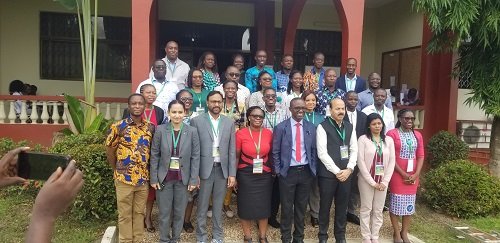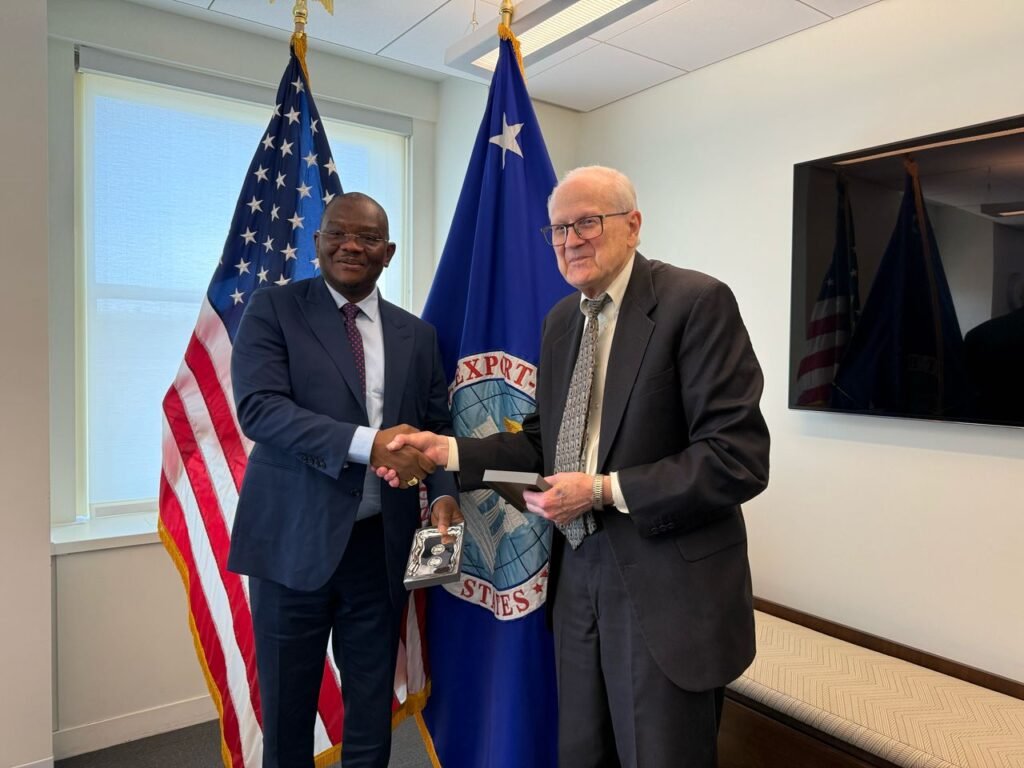Hot!
Research scientists brainstorm on new rice breeding technology

The research scientists after the programme
An international training workshop on new rice breeding technology has taken place here.
The training has been necessitated by the fact that the conventional method of rice breeding has become old and called for new technologies that could result in a faster, rapid and precise breeding.
Dubbed, “Accelerated Breeding Modernisation for Hi- Impact Rice Breeding, the four-day training brought scientists from Ghana,Senegal, Tanzania, Mozambique, Nigeria, India and Zimbabwe to the Crops Research Institute of the Council for Scientific and Industrial Research (CSIR-CRI),at Fumesua, near Ejisu in the Ashanti Region.
Speed breeding to shorten breeding cycle, smart breeding to enhance selection accuracy, breeding programme to enhance genetic gains, were some of the topics at stake.
According to Dr. Sanjay K. Katiyar, project coordinator, the global climate change was having a negative toll on rice production and to tackle that, there was the need for varieties that could grow very fast toward food security in Africa and the world as a whole.
Dr. Katiyar, who is a breeding modernisation lead at the International Rice Research Institute (IRRI), said there had been lot of surveys conducted in Africa which revealed the need to modernise the conventional way of breeding rice toward food security in the face of global climate change.
“We need to modernise the conventional method that has been in use for the past 60 years to be able to deliver high yielding crop varieties…there are now better ways or technologies for that”,he emphasised.
He said that the new technologies had nothing to do with the genetic modification, stressing “this is not an implementation of Genetic Modified Organism(GMO),we are only modernising the conventional system”.
Dr. Maxwell Darko Asante, Deputy Director of the CSIR-CRI, in an interview appealed to the government to operationalise the National Research Fund.
He explained that rice breeding was an expensive venture and needed heavy investment and stressed the importance of government to commit some amount of money to agricultural research in the country.
Dr.Asante observed that 1.4 million tonnes of rice was consumed yearly in Ghana while approximately half of that was produced, and that there was the need for government to be more dedicated to producing rice in the country to avoid huge amount of money used for its importation.
“We need heavy investment, without which the impact of our technologies and varieties would not be felt”,he noted, adding that government could dedicate about one per cent of the gross domestic product towards agricultural research in the country.
From Kingsley E.Hope, Fumesua
Hot!
GEXIM deepens relations with US EXIM Bank

A management team of the Ghana Export – Import Bank (GEXIM) led by the Acting Chief Executive, Sylvester Mensah met with the leadership of the Export–Import Bank of the United States (US EXIM) on Wednesday April 23, 2025 in Washington DC, United States of America.
The Acting President and Chairman of US EXIM, Mr. James C. Cruse and Vice President, International Relations, Ms. Isabel Galdiz received the GEXIM delegation, which included Deputy CEO for Banking, Mr. Moses Klu Mensah and Head of International Cooperation, Mr. Jonathan Christopher Koney at the headquarters of US EXIM.

The meeting offered the GEXIM team the opportunity to share the strategic direction of the Bank in line with the resetting agenda of the President of the Republic, His Excellency John Dramani Mahama for the repositioning of the Ghanaian economy into an export-led one by providing the requisite investment to Ghanaian businesses.
Mr. James C. Cruse expressed US EXIM’s eagerness to deepen its existing relations with GEXIM and proposed the signing of a new Cooperative Framework Agreement following the expiration of a Memorandum of Understanding signed in 2019 to utilize US EXIM’s medium term loan guarantees to procure machinery by GEXIM for qualified Ghanaian Small and Medium-sized Enterprises (SMEs).
Mr.Sylvester Mensah thanked the Acting President and Chairman of US EXIM for hosting the GEXIM delegation and reaffirmed the Ghanaian government’s commitment to strengthening trade and investment between Ghana and its global partners for economic transformation of Ghana with GEXIM playing a pivotal role.
The two teams will be meeting on the sidelines of the 2025 US EXIM Annual Conference on 29th and April 30, 2025 to explore possible areas of collaboration and matching Ghanaian businesses to American companies. The meeting ended with an exchange of gifts.
Hot!
Many SOEs have been used as mere instruments for personal wealth accumulation –Pres.Mahama

President John Dramani Mahama has expressed concern over the misuse of State-Owned Enterprises (SOEs) for personal financial gain by individuals in leadership positions.
Speaking during a meeting with Chief Executives of specified entities under the State Interest and Governance Authority (SIGA) on Thursday, March 13, the President directly attributed the dire state of SOEs to their leadership, accusing chief executives, management teams, and governing boards of prioritising personal enrichment over organisational efficiency.
He pointed to bloated budgets, unjustified allowances, and unnecessary expenditures as factors draining public funds while SOEs continue to rely on government bailouts.
“Many SOEs have been used as mere instruments for personal wealth accumulation by appointees. The chief executives, management, and boards of these enterprises are responsible for this situation. Some SOEs have become perennial loss-makers, draining public funds with bloated budgets, unjustified allowances, and unnecessary expenditures while relying on government bailouts as if entitled to them. Many of these entities are at their lowest point in the entire history of the Fourth Republic,” he said.
President Mahama further noted that many SOEs have been plagued by inefficiencies, corruption, and mismanagement, leading to consistent financial losses. He cited the 2023 State Ownership Report by the State Interests and Governance Authority (SIGA), which highlighted systemic inefficiencies and wasteful expenditures within these entities.
He therefore reaffirmed his commitment to reforming under-performing SOEs and ensuring they serve national interests.
He warned that loss-making SOEs will no longer be tolerated and will either be merged, privatised, or closed.
“I will assess you based on your performance. If you do not align with the pace of the reset agenda, you may be asked to step aside. If that adds to the horror movie, so be it,” he added.
Source: Myjoyonline.com







